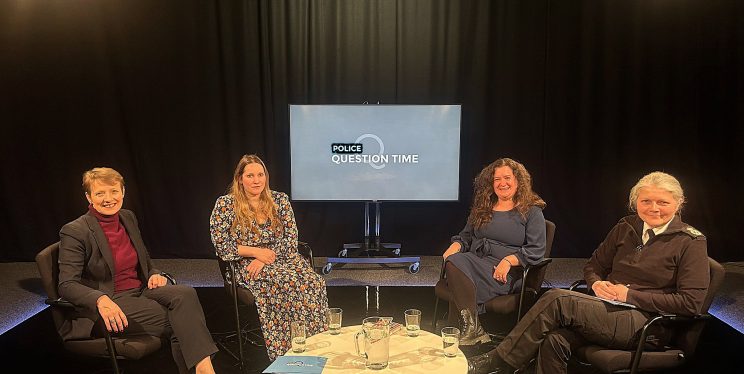PCC hosts expert panel to address male violence against women and girls – Police Question Time special

On Monday, as part of the global 16 Days of Activism against Gender-Based Violence campaign, PCC Clare Moody hosted a special edition of Police Question Time (PQT), focusing on preventing male violence against women and girls (MVAWG). The PCC brought together key voices from policing, community organisations, and advocacy to discuss collaborative strategies, share insights, and answer your questions.
Watch it back:
The panel
PCC Clare Moody was joined by:
Laura Bates, Campaigner, Writer, and founder of the Everyday Sexism Project
Sarah O’Leary, CEO of Next Link and Safe Link
Sarah Crew, Chief Constable, Avon and Somerset Police
This event directly supported Police and Crime Commissioner Clare Moody’s priorities as published in her Police and Crime Plan: reducing violent crime—particularly MVAWG—preventing crime through partnerships, and ensuring victims receive timely, effective support.
PCC Clare Moody said,
“I am explicit about the term male violence against women and girls because the victims are overwhelmingly female, and I’m afraid the perpetrators are primarily male as well.
“I think it’s really important that we describe this problem as we face it, in society at large.”
Questions answered
The panellists were asked questions from members of the public, which included:
Rebecca asked… What do you see as the causes of male violence against women and girls?
Campaigner and Author Laura Bates’ answer included the below,
“I think that one of the leading causes is the everyday misogyny in our society that if you like creates the more fertile ground from which the more serious abuses can spring.
“And it also creates the silencing affect that makes it so difficult for those who experience more serious forms of abuse to come forward. Because we’ve been programmed since birth not to trust ourselves. Not to take it seriously. Not to make a fuss. To doubt. To blame ourselves. To think that we were overreacting or to think it’s just the way things are, and we should just keep quiet.”
Chief Executive Officer Sarah O’Leary’s response included,
“Day in day out we hear from the women victim-survivors we support that if they express their own opinions to their partner, violence will escalate – because it is seen that they are not allowed to have an opinion.
“Those myths that women need to be doing all the household chores, that women should serve their husband – we see how that impacts the women – not only fuelling the violence and humiliation when women have those experiences, but actually creating very real barriers to getting help and support.
“Quite often when women contact us, they’ve experienced abuse over a number of years, and they have reached out and asked for support and they haven’t been believed by people. Or family members have said ‘Well, that’s just what men are like, men are like that.’ So misogyny creates very real everyday barriers and it really does trap and isolate women.”
Nikki asked…This is a big question, but how do we start to address these causes? What needs to change in education and how do we raise awareness?
Watch the panels answers in full above.
Somerset & Avon Rape & Sexual Abuse Support service, also known as SARSAS asked…
“We know that the majority of survivors don’t report sexual violence to the police. There are many reasons for this, including fear of not being believed, low charge and conviction rates, being asked to hand over personal information from their phones and/or counselling notes and the continuing reports in the media involving police officers as perpetrators of abuse. What would you say to someone thinking about whether or not to report a rape or sexual assault?”
Chief Constable Sarah Crew’s answer included,
“I would say first off, you’ll be believed. I think that’s the most important thing I can say. So often people feel that they won’t be. I think that’s often the first and most important thing someone wants to feel. People come forward to the police for a range of reasons, but safety is often a priority as well as seeking justice so – your safety is our priority.
“We’re here to support you and that can be done by policing, but it can be done by others as well, particularly if you still harbour some concern about policing. I’m thinking of the sexual assault referral centres or the services of independent sexual violence advisors who can guide you and navigate with you through the process…
“You’re in control, this isn’t the police taking the power away from you. This is working with you and involving you in the decisions to be made about what happens next.”
For the final question, PCC Clare Moody Clearly asked… What would a new policing and criminal justice approach to dealing with MVAWG look like in practice and how is the system set up to respond to this?
Watch the panels answers in full above.
If you’ve got a question you would like to submit for consideration for a future PQT session, please email policequestiontime@avonandsomerset.police.uk
